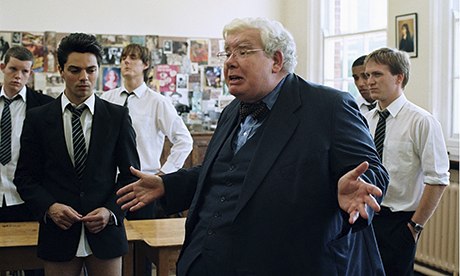It's not surprising that Alan Bennett's The History Boys is Britain's most popular play. The unfairness within our education system endures

Dominic Cooper and Richard Griffiths as Hector in The History Boys, a film of the play by Alan Bennett. Photograph: Allstar/BBC/Sportsphoto Ltd
There are obvious pitfalls in reading too much into the news that Alan Bennett's The History Boys has just been voted the nation's favourite play. After all, Bennett's 2004 play had a long run in London, toured extensively over many years and has been made into a successful movie. So the simple fact is that a lot of people have seen and enjoyed it. This familiarity means The History Boys was therefore in an ace position to win the contest organised by the English Touring Theatre.
Conversely, the limits of access surely also explain why Bennett's play did not top the poll in London and the south-east of England, where the palm for favourite play went instead to Jez Butterworth's Jerusalem. There's no way that Jerusalem, with its life-enhancing celebration of anti-authoritarianism and the spirit of William Blake, would bomb outside London. On the contrary. It's just that theatre-goers in the rest of Britain have had much less chance so far to see Butterworth's wonderful 2009 play than Londoners have.
Other geographical differences also counsel against over-interpretation. It may be tempting to suppose that Ulster's recent history has something to do with Hamlet, not the Bennett play, topping the poll in Northern Ireland. All those ghosts of the past, those dead bodies, those unavenged murders, that instability at the heart of the state; maybe it all adds up. But Hamlet is also the favourite in south-west England, where ancestral internecine conflict and grievance is generally – though I may be wrong – less pronounced. So the easy explanation seems to fall short.
So what does explain the slightly curious fact that a play about a group of northern state school sixth-form boys preparing for Oxbridge in the 1980s touches such a modern national chord? Availability of and access to performances is obviously important. The sociology of theatregoers probably matters too. The play's wit, character and pace give it further advantages – there's no denying that we British like a laugh in our plays. Bennett's much-loved status, as he approaches his 80th birthday next year, undoubtedly helps as well.
But the deeper answer to the status of The History Boys also lies somewhere in the synergy between two other things. The first is hinted at by the fact that Bennett's play topped the poll in north-west England, north-east England, eastern England and the Midlands. Bennett writes about – and also for – the neglected half of Britain that is neither bathed in the glow of London's excitement and prosperity, nor culturally distinct enough to be governed by devolved institutions. In his quirky way Bennett is the playwright, rather as JB Priestley once was, of the post-industrial England of which so many in the south are both ignorant and disdainful.
The second factor, which overlaps the first in some ways, is that The History Boys is not in the end just a comedy about school and growing up – though of course it is both these things too. It is also an angry lament for the passing of a state school education system of which Bennett himself is such a flowering.
In spite of what you may read in Private Eye, there are one or two of us Guardian columnists who are wholly state educated and proud to have sent our own children to state schools too. As someone who not only went to a state grammar school in the north of England – like the one in The History Boys – but also to the very school in Leeds that Bennett (whose father was our local butcher when I was a boy) attended himself, there is nothing quaint or exotic to me about the world of his play. My school was like that.
Moreover, like Bennett, I am a history boy. My generation falls halfway between Bennett's own and the one he depicts in his play. Nevertheless, the school he describes in his introduction to The History Boys is in every way one that I recognise, with its excitements, its insecurities, its snobberies and its occasional very real cruelties. I can never forget the long-haired boy who was called into the headmaster's study and physically restrained while another teacher attempted to cut off his hair. The boy broke free, ran screaming from the school, and rightly never came back.
But I also recognise the pride and the civic benevolence. As Bennett says in that introduction, if you got into Oxbridge, as he did and I did, you got your photo in the local paper and your education was paid for. Bennett's wholly correct assertion that there was genuine civic pride in such achievements was brought home to me when, as an undergraduate, I applied for an extra year of grant from Leeds education department. Back came a letter, handwritten by the chief education officer, Mr Taylor, agreeing to the application on the grounds that he was confident I would continue to bring distinction upon Leeds in the years ahead. A letter like that seals a deal with a place for life, I can tell you.
We live in a different country today, of course. Good secondary and higher education and training for all – and not just for some, as in the 1960s – are expensive. Good teachers don't grow on trees and are not cheap to train or retain. As Ofsted said only this week, access to the best teaching is often down to good luck as much as to socioeconomic status.
But this unfairness is not equally shared. Nearly 60 years ago, the undergraduate Bennett was struck by the unfairness that memorable teachers – like the unforgettable Hector he placed in a state school in The History Boys – seemed to be concentrated in the private schools. That unfairness is still with us today. The price Britain pays for the privileges bought by the few for their children is still far too high – and we all know it.
The History Boys is "about" lots of things. A large part of it, though, is about the fact that the chance to thrill to, and benefit from, great teaching is neither a high enough public priority nor shared out fairly.
The crucial line in the play is the last one. Hector says simply: "Pass it on." What is to be passed on is partly the love of knowledge, of ideas, thinking and talking, of education. But there is also a more indignant political message about passing on the unfinished business of educational unfairness. You can't look at Britain today and not see how unfinished that work is. That is surely part of the explanation of why Bennett's play connects so powerfully with so many.

No comments:
Post a Comment